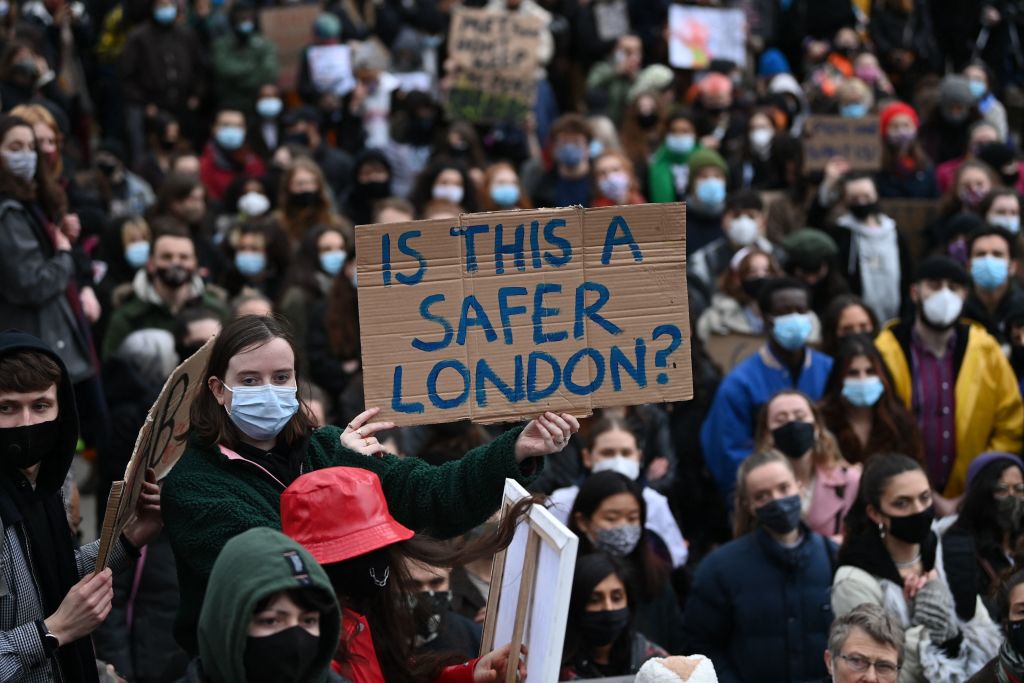It has been a dreadful week for the police. A police officer has been charged with the kidnap and murder of Sarah Everard; officers badly mishandled the Clapham Common vigil, drawing political criticism from all sides; there have been numerous calls for Commissioner Cressida Dick to resign; and now another officer involved in the search operation for Sarah Everard is under investigation for sending his colleagues a graphic meme about violence against women.
In an attempt to get a grip on the situation, Boris Johnson has announced a new plan to protect women: bars and nightclubs will be patrolled by plain clothes officers to identify predatory men. There will also be a £25million funding increase for the Safer Streets initiative, which will mean extra lighting and CCTV for dangerous areas.
There are numerous potential problems with this plan. Firstly, plain clothes police officers hardly act as a deterrent. Will creepy men be dissuaded by the mere suggestion that there might be an undercover police officer who might just see something in a dark, noisy, crowded space? It seems woefully naive to think it will. Secondly, anyone who does want to report a crime isn’t going to know who to approach for assistance, and so women are hardly going to feel safer.
Project Vigilant – as the scheme is being called – could also very easily turn into Project Vigilante
The decision to use plain clothes officers is a strange one. Is this part of an ‘emperor’s new clothes’ tactic? After all, the force can hardly be held accountable, because the public do not know how many officers are actually deployed or not.
The rules of engagement are also unclear. Will the officers turn a blind eye to other crimes, for example drug use and non-sexual violence? There are reports that patrols will be stepped up at closing time, but will this help women worried about their journeys home? There has been a 43 per cent rise in reports of sexual assault on the Tube since 2016, so it’s hard to see how undercover officers in nightclubs will help to address this problem.
Project Vigilant – as the scheme is being called – could also very easily turn into Project Vigilante. Predators could pretend to be plain clothes police officers, and police officers could also abuse their position of power. A new bill allows undercover agents to commit crimes on operations; this could give rogue police officers – however rare or not they may be – greater immunity from prosecution. Harriet Harman, who chaired the Joint Committee of Human Rights, said the bill ‘raised the abhorrent possibility of serious crimes such as rape, murder or torture being carried out’ under the guise of authorisation.
This may seem unlikely, but the Met has a PR problem and needs to win back the public’s trust. Only one in every eighteen members of the Met accused of sexual assault over a six-year period were subject to any type of formal action. 562 officers were accused of sexual assault, and yet only 14 retired or resigned. Police officers have also assaulted civilians by using their credentials to gain their trust. PC Adam Provan, who repeatedly raped a 16 year old, is just one example.
If the goal really is to drive out violence against women and girls, then bars and clubs are not the places to be targeted. 70 per cent of female murder victims are killed in their own home, and 77 per cent are killed in a residential building (men, on the other hand, are much more likely to be killed in a public space). Only 13 per cent of female murder victims are killed by a stranger; and where suspects are identified, over half are their partner or ex-partner. According to the charity Rape Crisis, 90 per cent of rape victims know the perpetrator, and 90 per cent are raped in their homes, work settings, or other places they feel safe.
There is also the question of funding. While it is not clear how much Project Vigilant will cost, nor how it will be paid for, the reality is that the police are already over-stretched and under-resourced. The money could easily be better used elsewhere. Why not allocate these funds for investigating cases of rape, harassment and domestic abuse, or other serious crimes?
For all the talk of this new initiative, it is well worth remembering that 95 per cent of burglaries and robberies go unsolved (the number of suspects who are caught and punished has halved in the last five years), knife crime is at a record high, and the number of domestic child killings almost doubled in 2020. Police should deal with these issues rather than focusing on rolling out eye-catching but ultimately flawed new ‘projects’.
In its hastiness to seem proactive, the government has rushed through a policy that doesn’t reflect the reality of the situation nor the risks the public face. At best, Project Vigilant is a gimmicky misunderstanding. At worst, it’s a dangerous misallocation of resources that will only erode the trust between the public and the police further.






Comments